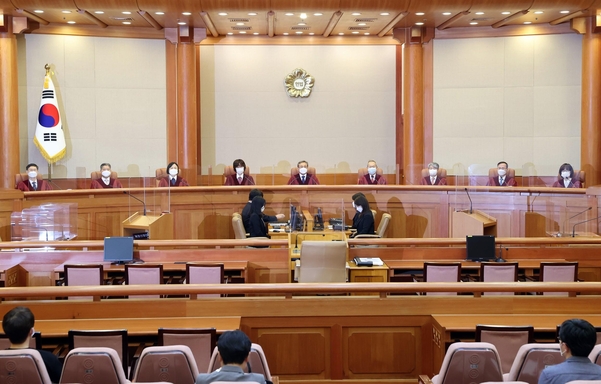Input 2021.01.28 14:32 | Revision 2021.01.28 15:11

The Constitutional Court, at 2 p.m. on the same day, stated that the law on the establishment and operation of criminal investigation centers for high-ranking public officials was unconstitutional. Decided to be constitutional. Rep. Yoo’s request was represented by a conservative lawyer group, a group of lawyers for human rights and unification on the Korean Peninsula (Hanbyun).
The Constitution said, “We dismiss all requests for adjudication against Article 3, Paragraph 1, and Paragraph 4 of Article 8 of the Act on the establishment and operation of airlifts revised on December 15, 2020.” .
In February of last year, members of the Future Integration Party (predecessor of the People’s Power) claimed that the airlift was a’superconstitutional state institution’ and requested a constitutional complaint against the airlift law. They argued that the government’s stand-off agency was contrary to the principle of separation of powers, which means separation of powers.
According to the Constitution’s judgment, it is against the claim that it is against the constitutional principle of separation of powers that the Airlift Act establishes the investigation office as an institution that does not belong to any of the legislative, administrative, and judiciary departments under the constitution so that it does not receive any control or supervision from the President or the National Assembly The investigation department) judged that it cannot be considered that it is not affiliated with the administration.
On the basis of that, the Constitution acknowledged the legal status of the airlift, saying, “The Airlift Act is that part of the prosecution’s power is distributed to the investigative offices, and the investigation office is essentially carrying out administrative affairs under our Constitution.”
Next, the President holds both the right to appoint and dismiss the head of the investigation department, the deputy chief of the investigation, and the authority to dismiss the prosecutor of the investigation department. It was interpreted that it was not possible and that’substantial personnel rights’ were recognized.
The Constitution stated, “The fact that the constitution has provisions on the basis for establishment of the Board of Audit and Inspection, etc., is merely specifying the basis for establishment in consideration of the nature of the institution and the importance of work from a constitutional point of view. The establishment of an administrative agency called “is not prohibited under the constitution.”
Regarding the part where there is no regulation on the establishment of investigation agencies under the Government Organization Act, “The Government Organization Act is a general law on the establishment and organization of state administrative agencies, and cannot be said to be a higher law than the Airlift Act, and the revised Government Organization Act also provides uniformity in the management of government organizations. It can be seen as to stipulate the general principle of specifying central administrative agencies in order to secure the government and to ensure the right to know the public about the constitution of the government,” he said. “Therefore, it is the constitution to establish a central administrative agency not specified in the Government Organization Act as another law. It is difficult to say that it is prohibited.”
As the Constitutional Constitution decides to be constitutional in the Airborne Ministry Act, it is expected that the work of organizing the airlift department will accelerate.
Earlier, the Minister of Public Affairs Kim Jin-wook said, “If a constitutional constituency decision is made, I will say it if I can speak accordingly” regarding the timing of the deputy director’s proposal. Deputy Director Kim is scheduled to hold a briefing at 5 pm on the same day at the Government Complex in Gwanghwamun, Seoul, and give a position on whether to relocate, such as the recommendation of the deputy director and other cases of Insun and Kim Hak.
